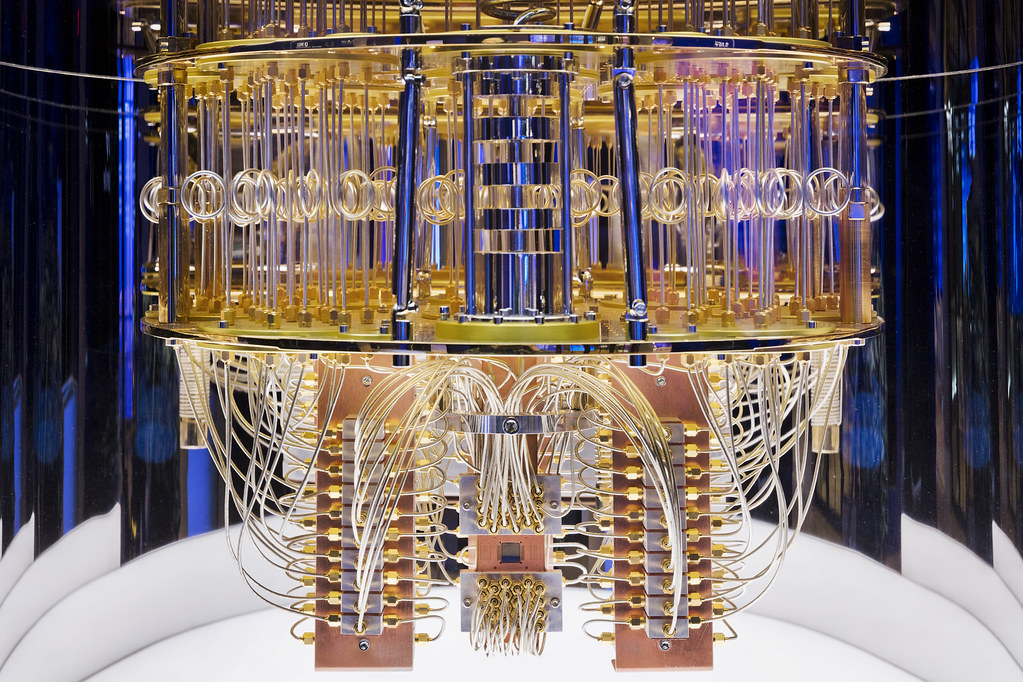
Quantum computing-powered artificial intelligence may help pave a cheaper, faster path for drug discovery. Pictured: the interior of an IBM Quantum computing system. Credit: IBM.
Penn State researchers to explore using quantum computers to design new drugs
Posted on October 27, 2022UNIVERSITY PARK, Pa. — The time it takes medicines to move from discovery to approved use for patients can take decades and cost billions of dollars. Now, a $1.2 million National Science Foundation grant will help a team of Penn State researchers study the use of quantum computer-based artificial intelligence (AI) to see if quantum computers can bring drugs to patients faster and cheaper.
Quantum computing differs from classical computers because quantum devices use quantum bits — or qubits — rather than classical bits. While bits can only be in binary positions of 1 and 0, qubits rely on the quantum mechanical principle of superposition that allow them to be in 1 and 0 positions simultaneously. Qubits can also be entangled, which means their states are intricately correlated. Theoretically, the devices’ computational potential increases exponentially for every qubit the scientists can entangle.
According to Swaroop Ghosh, associate professor of electrical engineering and computer science and the grant’s principal investigator, these strange — but scientifically proven — abilities give quantum computers the possibility of delivering exponentially more processing power to better handle certain complex problems.
Ghosh added that using artificial intelligence (AI) models designed for quantum computers could be ideal for drug discovery, an area limited by current classical computing processing power.
“Quantum AI models are claimed to be more expressive compared to the classical neural networks -— in other words, they have higher capability to approximate a desired functionality compared to the classical AI models of similar scale,” said Ghosh. “Quantum computers bring effective sampling capabilities so they may be able to model useful distributions of drug-like molecules more efficiently than classical computers. Evolution of quantum primitives, such as quantum memory, can offer further speedup for machine learning tasks since the training data can be directly processed in the quantum domain.”
According to Nikolay V. Dokholyan, G. Thomas Passananti Professor, Penn State College of Medicine and co-principal investigator for the project, quantum computers could cut down on costs associated with finding drugs, as well as shorten the time it takes these needed treatments to reach patients.
“Drug discovery is a lengthy process that can span a decade and costs billions of dollars,” said Dokholyan, who is also an associate of Penn State Institute for Computational and Data Science (ICDS). “Currently, the pace of Federal Drug Administration (FDA) approval of new compounds is only about 40 novel compounds per year. Accelerating drug discovery by computationally screening a massive number of compounds promises to significantly reduce the costs and time for finding effective new cures against diseases. Unlike the traditional computational drug screening approaches that target libraries of billions of compounds, utilizing Quantum Computers along with novel AI-driven algorithms promise to cover a vastly larger chemical space.”
Creating drugs quickly and cheaply means that lives will be saved, according to Ghosh.
“We lose millions of lives every year to diseases like cancer, for example, and the recent pandemic also indicated that we are ill-prepared to find effective drugs quickly,” said Ghosh.
The researchers are particularly interested in leveraging quantum AI to design drug treatments that could inhibit Ras family of proteins, which would be important for cancer treatments and cures.
